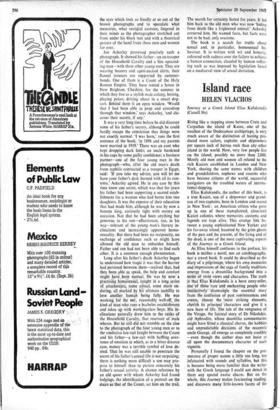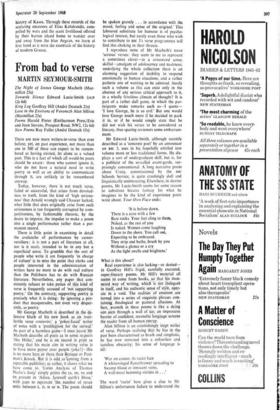Island race
HELEN VLACHOS
Journey to a Greek Island Elias Kulukundis (Cassell 36s) Rising like a stepping stone between Crete and Carpathos the island of Kasos, .one of the smallest of the Dodecanese archipelago, is very much aware of the distinction of having pro- duced more sailors, captains and shipowners per square inch of barren rock than any other island in the world. Now, very few people live on the island; possibly no more than 2,000. Mostly old men and women all related to the rich Kasiots established in London and New York, sharing the same names with children and grandchildren, nephews and cousins who have become citizens of the world, successful navigators on the troubled waters of interna- tional shipping.
Elias Kulukundis, the author of this book, is a true Kasiot, son of a shipowner and grand- son of two captains, born in London and reared in New York : an American citizen- who grew up in one of these transplanted, close-knit Kasiot colonies where memories, customs and legends are kept alive. This strange link be- tween a young sophisticated New Yorker and his far-away island, haunted by the grim ghosts of the past and the present, of the living and of the dead, is one of the most captivating aspects of the Journey to a Greek Island.
Ai Elias himself confesses in the preface, his book is neither a novel, nor an autobiography, nor a travel book:' It could be described as the diary of a pilgrimage,-where his own memories and impressions of the saga of family traditions emerge from a dreamlike background into a series of Vivid views and characters. The truth is that Elias Kulukundis is a born story-teller, one of those rare and enchanting people who instinctively disentaitle the essential story froM the confusion of past reminiscences and events, choose the 'most striking elements, cheriih its pfinciparcharacters and give it a new lease of life. The tale of the vengeance of the Virago, the farcical story of Dr Nikolakis, old Aphrodite, whose doomlike commentaries might have fitted a classical chorus, the hobbies and unprediaable decisions of the eccentric uncle George, all emerge as completely credible —even though the author does not insist at all upon the documentary character of each vignette.
Personally I found the chapter on the pro- venance of proper names a little too long, too infatuated with sounds and syllables, but this is because being more familiar than the writer with the Greek language I could pot detect in them any special exotic charm. But on the whole, this Journey makes fascinating reading and discovers many little-known facets of the
history of Kasos. Through these records of the seafaring ancestors of Elias Kulukundis, com- pelled by wars and the scant livelihood offered by their barren island home to wander over and away from the blue Aegean, we learn at first hand as it were the essentials of the history of modern Greece.











































 Previous page
Previous page